- Home
- Alex Archer
Seeker’s Curse Page 6
Seeker’s Curse Read online
Page 6
It wasn’t hard to find—an old British colony, heavily influenced by India and increasingly by the U.S., Nepal depended almost entirely on tourism to keep its economy rolling. So even in this remote place English-language signs abounded alongside the curvy local writing.
The cop shop was a three-story building with a roof of dove-gray slate. The Baglung contingent of the armed police force were glum and wary little men in brown berets, light gray shirts, darker gray trousers with white-and-orange stripes down the legs, black belts and boots. Their holsters held modern Glock autopistols, Model 19s with high-capacity 9 mm magazines.
To Annja’s surprise each Glock was counter-balanced by what looked like a forward-curved short sword on the other hip. These had to be the Nepalese kukris, made famous by their Gurkha mercenary troops. They still carried them in modern-day assignments in Afghanistan and elsewhere. Annja hadn’t expected to see police officers toting huge fighting knives, though.
She filled out the usual reams of paperwork. She was all aboveboard, prepared to brandish her documents from the JBF, as well as the letter of recommendation the well-respected Lama Omprakash had provided her in Lumbini.
The police didn’t care. Without so much as glancing at her archaeological bona fides the officer referred her to the Baglung District commissioner for antiquities, a man named Chatura.
Somewhat to her surprise the district antiquities office lay outside of town proper, on a rocky little rise surrounded by dwarfish, wind-gnarled evergreens. Hiking up to it, Annja found herself running short of breath despite the fact it was an easy walk, even lugging the bulky backpack that constituted her entire luggage for this expedition. She knew it was the altitude, of course. Baglung was something upward of 6500 feet. Nothing serious—yet.
But serious was coming. She glanced at the white-clad mountain, which, though distant, loomed over the town.
The stout, almost fortified appearance of the antiquities office startled her. It was a one-story stone blockhouse with narrow slit windows set high off the ground. Its position gave it a commanding view in three directions. The hill behind was steep enough to make it tricky for attackers to negotiate, and mostly bare of cover. It must, she realized, have been a colonial police outpost at one time.
The whitewash on the stones looked fairly recent to her archaeologist’s eye. That made the gray dimples of bullet impacts in it even more recent.
“Well,” she muttered to herself, standing outside the scarred red wooden door, “they warned me civil disorder was on the rise here.” Although it looked to her as if somebody had behaved in a most uncivil manner toward the blockhouse’s occupants.
Hoping that the antiquities department had only moved in recently—say, after all the gun battles—Annja stepped inside. Small copper bells hanging from the knob by a leather strap tinkled as she shut the door behind her. She entered a small room with a couple of chairs and a big metal desk. She shrugged off her big pack and let it down to the bare concrete floor.
Though large and solid enough to suggest it could be pretty bulletproof—to Annja’s relief, she couldn’t seen any actual evidence it had taken gunfire—the desk wasn’t the dominating design element in the room. That honor belonged to the gigantic portraits hung on the rear wall, flanking and indeed somewhat dwarfing a map of Baglung District.
One of the portraits sported the unmistakable huge head and wide grim face of Mao Tse-tung. The man in the other picture, this one a photo, was leaner and wore spectacles, but was equally humorless. The man was still pretty sturdy, with a seamed square face sagging into middle age behind glasses and a large mustache.
She was so engrossed staring at the portrait she barely heard the door in the back open and someone come into the room.
“This is Prachanda,” a voice said in English. “He whose clarity of vision lights the way forward to a progressive future for all nations, not just Nepal.”
“Really?” Annja said. “I’m pretty a political myself.”
“Not to be political is to be political,” the man said sternly. “I am Chatura, district commissioner of the Antiquities Division of the Ministry of Culture, Tourism and Civil Aviation for Baglung. And you must be the American archaeologist I was informed had arrived.”
“Uh, yes. My name is Annja. Annja Creed.” She proffered the thick bundle of papers she’d accrued since entering the country.
Chatura accepted them with a sour expression. He leafed through them, scowling.
“You will investigate shrines, then?”
“And catalog them for proper preservation, yes.” Once again, telling as much of the truth as possible seemed her best path.
Chatura’s mouth pinched beneath his nose. “So you will celebrate and propagate the pernicious superstitions which have held humanity back for so long,” he said. “The Great Steersman had the correct idea with his Great Proletarian Cultural Revolution, purging such baggage and breaking the chains of the past.”
Annja didn’t like where the conversation was headed. “But these shrines are priceless relics,” she couldn’t help saying. “Common heritage of all humankind.”
The little bureaucrat sneered. “A common burden on mankind,” he said. “And you have come bringing your Western decadence and your oh-so-corrupting American dollars. Which do not buy so much corruption as once they did, do they?”
She shrugged. Her shoulders were knotting with tension. She had a hard time reining in her anger. But she knew it was vital she do so. She wouldn’t be helping her employers or Nepalese archaeology—or her bank account, as Roux would no doubt rush to point out—if she was deported before so much as glimpsing a single shrine, with the exception of Lumbini, which was somewhat tacky and in any event the opposite of lost.
A small man with a round belly and hair cropped close to his round head, the district commissioner didn’t exactly look like an intrepid former guerrilla, Annja thought. He must be some old Party hack, not a front-line fighter. Instead of being rewarded for long years of drudgework he’s been stuck off in this nowhere job in a blockhouse outside a hick district capital, where the people with real power won’t have him underfoot. No wonder he’s bitter.
As if to confirm her diagnosis, he sighed and tossed the sheaf of official documents onto the desk. “It is the policy of the central government,” he said with contemptuous emphasis, “that the ministry coddle and empower foreigners who seek to meddle in our country, in the name of a past filled with oppression and slavery. In the interests of the proletariat our general secretary sees fit that we obey such edicts. And so my hands are tied. I must permit your survey. You will of course tender me a full report of its results.”
“Of course,” Annja agreed, know full well this was not a man to be trusted.
“But be aware, Ms. Creed,” Chatura said. “If you engage in any counterrevolutionary activity the consequences shall be swift, sure and severe. I shall be watching you.”
He smirked. “I shall watch you very closely indeed.”
9
“Annja,” a man called from twenty yards downslope of her. “Look there.”
It was late afternoon in the remote country northwest of Baglung, near the fringes of the Dhorpatan Hunting Preserve, which clung to the base of the Dhaulagiri Himal subrange of the Himalayas. A light overcast covered most of the sky. The wind rustled in the dry brush around them. Some kind of bird was persistently whistling, unseen nearby.
Crouched down next to a jumble of head-sized granite rocks with tufts of tan grass sprouting from the cracks, trying to figure out whether the formation was natural or had been piled by human hands—indicating a possible hidden shrine—Annja straightened and turned. Her chief guide and outfitter, Prasad Ale Magar, was pointing a baggy-sleeved arm back down the rocky valley.
A small knot of men were hiking up the sloping valley perhaps five hundred yards behind and below them. Annja grabbed her binoculars. She held them to her eyes and adjusted the focal length.
“They carry rifles,”
Prasad said. He was short, like most of the Nepali Annja had encountered, wiry and bowlegged, with a face seamed by long exposure to the sun. He was on the long side of middle age, late fifties or sixties. Or so she judged—his hair, cropped close to his head, was the color of cold rolled steel. But the years hadn’t much diminished his sight.
His unaided vision confirmed what Annja’s binoculars were telling her. She counted perhaps half a dozen men. At least three carried long-arms. One of them, to Annja’s surprise, was unmistakably a long black M-16. She knew the American-made weapon was standard issue to the Nepali armed forces.
She pointed that out to her guide. “Should I feel reassured?” she asked. “I wouldn’t think Maoist guerrillas would carry a Western-made weapon, would they?”
“Like everyone else, the guerrillas must make do as best they can,” said Lal, Prasad’s nephew and chief helper. He straightened from chopping some brush away from a possible opening in the rock-pile and wiped sweat from his brow with the back of his hand.
He was a pleasant young man with a shock of heavy blue-black hair and a kind of sad downturn at the outside of both his eyes that didn’t seem mirrored in his manner or his grin, which was frequent.
Annja’s third local helper, a cousin of Prasad’s named Bahadur, set his pick down and stood up to wait and watch.
“Will they give us trouble?” Annja asked. Lal had a rifle himself, an old bolt-action British Enfield .303 propped against a rock. As friendly and helpful as the family had been they had not even asked if their carrying weapons would bother their employer.
It might’ve bothered most tourists but it didn’t bother her. She was a firm believer in self-defense. Especially in a part of the world where insurrection and banditry, wherever you drew the line between them, were on the rise.
Prasad shrugged. “Armed strangers can always bring trouble. We can only wait and see.”
Still showing no outward sign of having noticed the team, the strangers vanished behind a shoulder of land to Annja’s right.
Prasad said something in the local language.
Lal nodded. Without another word he picked up his Enfield and scrambled up the rock-strewed slope above them. In a moment he was out of sight like a prairie dog down its hole.
Annja noticed the older man watching her with a guarded smile. She guessed he wanted to know whether she wished to try eluding the armed party or not. She noted his body language—he stood centered, legs slightly flexed, almost a wrestler’s posture of readiness for anything. It was his basic posture. He showed no trace of nervousness or any desire to flee.
She nodded. Experience had stamped into her pretty deeply a rule about expeditions in the outback anywhere—vet potential local assistants and employees rigorously, and if they proved worth taking on, trust them implicitly. Even, or perhaps especially, when their advice or actions ran contrary to Western wisdom.
Annja had seen too many expeditions hit the rocks—from being flooded out by unexpectedly early monsoons to capture and being held for ransom by grumpy armed formations—by ignoring what the local helpers said.
Without presuming to speak, Prasad was telling her that there was no point in trying to hide.
“So what do we do?” she asked him.
His smile widened slightly. Clearly it pleased him his employer was proving reasonable. But his eyes continued to scan their backtrail where the mysterious men had disappeared.
“As I have said,” he said. “We wait. See. Be prepared for what the next turn of the wheel brings.”
“Meaning if we’ve seen them they’ve seen us, right?”
He laughed. “Truly you are wise beyond your years, Annja Creed.”
She sat on a big rock near the base of the outcrop of gray stone she’d been working. She might as well conserve breath and energy for whatever came next. Though geologically already in the Lesser Himalayas, they weren’t high up by Nepali standards, maybe eight thousand feet. Annja still had to remember to take frequent breaks.
Prasad and Bahadur stood on a relatively level patch of ground a few feet below her. They lit cigarettes and puffed stolidly away. Prasad stood. Bahadur squatted beside him.
They waited. As she often did Annja grew aware of the presence of the mighty main peak, Dhaulagiri I. Even with her back to it Annja could feel it like a living presence, ominous, overpowering.
A harsh voice suddenly hailed them from the slope of a rise to her right. Six men appeared and began to scramble down the scrubby slope toward them. If I saw all of them they haven’t left any kind of reserve in hiding, she thought.
As the party approached she stood and called out. “Hi. Can we help you?”
Being polite and respectful, she reckoned, gave them the best chance of avoiding a nasty confrontation.
The newcomers swaggered up smoking and joking, as Annja’s military friends would put it. They acted careless, in the sense that they apparently saw nothing here to care about. Her team showed no visible firearms. Prasad and Bahadur wore big knives. While they were clearly related to the kukri, the men used them so casually in the most brutally utilitarian contexts, as machetes, axes or even pry bars, that Annja presumed they were tools rather than weapons. Although that didn’t mean they couldn’t do damage.
One man stepped forward. A black leather belt, faded and cracked but looking like some kind of official issue, circled his rather capacious waist. A burly revolver rode in a holster on his right hip. Though the closed flap concealed most of it, Annja made it for a double-action Webley, the signature sidearm of British colonialism. As the Enfield had so long been its signature long-arm.
He spoke to Prasad.
Annja was able to make out the meaning of one phrase. “My name is Agrabat.”
Two men with long-arms flanked him. To his left was a big man who looked like an overstuffed has-sock with tufts of horsehair stuffing sticking out from random locations. He held a single-shot break-action shotgun. The stock had weathered to drift-wood gray. The forestock was split down the middle and attached to the long barrel with windings of tarnished copper wire. It looked like a 12-gauge. Annja judged that if he triggered that sucker off, it was even odds whether it would burst in his hands. That didn’t make it any less dangerous to her and her friends.
On Agrabat’s right a shorter, leaner man with an M-16 was shifting his weight constantly from one boot with the sole held on by electrician’s tape to the other. Despite the growth on his lupine jaws, which had gone beyond stubble to a sort of patchy black mat without rising to the status of a real beard, he looked like a kid.
The leader spoke self-importantly. Prasad listened intently and nodded. The other three newcomers carried drawn kukri-like knives but no other weapons. Annja guessed Agrabat’s sidearm, traditionally allowed only to officers, was his badge of authority.
“He says that they are tourist police,” Prasad said when Agrabat finished. “He says he has heard we might be conducting unlicensed explorations.”
“Where’s his hat?” Annja asked. On her way to Nepal she had done a little of her customary Internet research into the law-enforcement structure of her destination. She knew a few things about the tourist police, who were associated with Commissioner Chatura’s ministry.
Deadpan, Prasad relayed the question. The bearish man with the shotgun growled. Agrabat laughed.
“We are undercover,” he said through Prasad.
“But there’s no tourist police detachment in Baglung,” she pointed out. “And also, aren’t you supposed to be chosen for your command of English?”
She thought she saw Prasad’s right eyebrow twitch up about a hundredth of an inch. She smiled at him. She already suspected this would not end well. Certainly these men were no more police than she was.
Shrugging scarcely less microscopically, he turned and conveyed her words to Agrabat.
“Bah,” he said. “Enough delay. If you have the proper authorization, produce it at once!” he ordered.
Annja was ready for that
. Specifically she was prepared for the common trick, used by the ill intentioned on both nominal sides of the law, of grabbing her papers and refusing to give them back. Before ever setting forth from Baglung she had made Prasad hunt down for her perhaps the only copy machine in the town not in some official office. Well, actually, she thought it was in some official office, but it was after hours and another cousin let them in the back. She had made multiple copies of all her documentation. It constituted their single heaviest item of luggage.
Agrabat accepted her authorization from the armed police and the ministry. He studied them with a deepening scowl.
“He might have better luck with that if he turned them right side up,” Annja said. Then, hastily added, “Don’t translate that.”
Agrabat dashed the papers to the ground. “Don’t try to hide it!” he shouted, spewing spittle. Fortunately Annja was ten feet away and out of range. “You’re hunting treasure!”
Uh-oh, she thought as Prasad translated. She wondered if Prasad had spoken too freely with his extended family.
“Not the kind you’re thinking of,” Annja replied calmly. “We are cataloging shrines for eventual preservation by the Ministry of Culture, Tourism and Civil Aviation.”
“You find treasure!”
“No,” she said.
In a week of tramping the uplands, basically the enormous widespread skirts of the mountain, her little team had turned up numerous shrines—in rock cairns, tumbledown wooden lean-tos, in caves. Some really did seem to have been lost; she wasn’t sure she would have characterized any as hidden. Aside from statues of the Buddha, mostly running to gold-painted plaster of paris castings, they contained nothing that even the most avaricious optimist could call treasure.
More to the point, none were of particular antiquity. In a few cases it was hard to tell. But since this was a survey, not an excavation, all Annja could do was inspect the sites, photograph them on her digital camera, log them in her GPS and move on.

 Rogue Angel: Forbidden City
Rogue Angel: Forbidden City The Spider Stone
The Spider Stone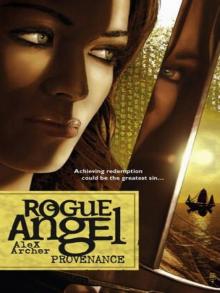 Provenance
Provenance Blood Cursed
Blood Cursed Fury's Goddess
Fury's Goddess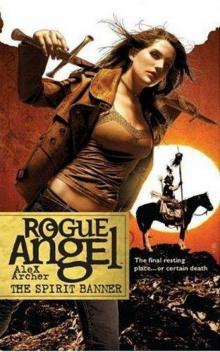 The Spirit Banner
The Spirit Banner Footprints
Footprints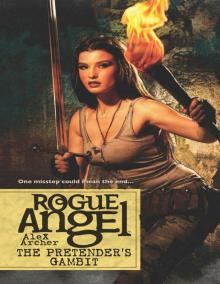 The Pretender's Gambit
The Pretender's Gambit Rogue Angel: The Lost Scrolls
Rogue Angel: The Lost Scrolls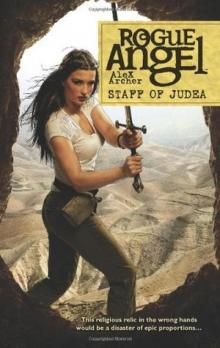 Staff of Judea
Staff of Judea Rogue Angel 55: Beneath Still Waters
Rogue Angel 55: Beneath Still Waters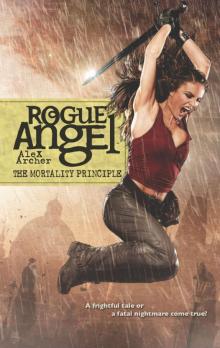 The Mortality Principle
The Mortality Principle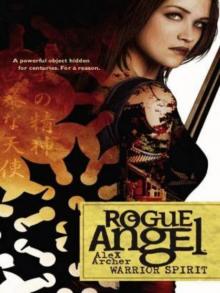 Warrior Spirit
Warrior Spirit Paradox
Paradox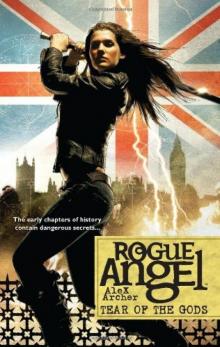 Tear of the Gods
Tear of the Gods Forbidden City
Forbidden City River of Nightmares (Rogue Angel)
River of Nightmares (Rogue Angel) Rogue Angel: The Secret of the Slaves
Rogue Angel: The Secret of the Slaves Destiny
Destiny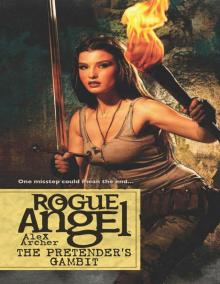 Rogue Angel 51: The Pretender's Gambit
Rogue Angel 51: The Pretender's Gambit Celtic Fire
Celtic Fire Rogue Angel 54: Day of Atonement
Rogue Angel 54: Day of Atonement Day of Atonement
Day of Atonement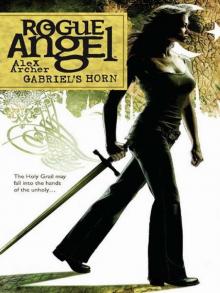 Rogue Angel: Gabriel's Horn
Rogue Angel: Gabriel's Horn Grendel's Curse
Grendel's Curse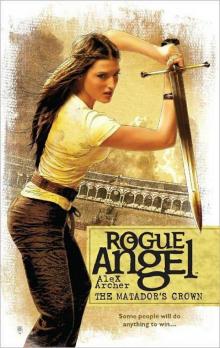 The Matador's Crown
The Matador's Crown Rogue Angel: The Chosen
Rogue Angel: The Chosen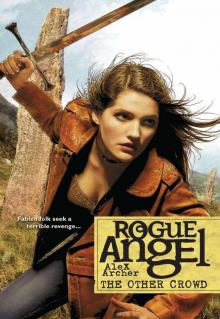 The Other Crowd
The Other Crowd Seeker’s Curse
Seeker’s Curse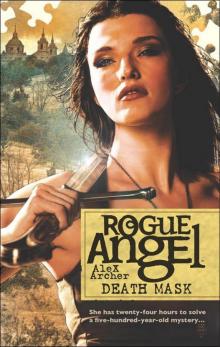 Rogue Angel 52: Death Mask
Rogue Angel 52: Death Mask The Golden Elephant
The Golden Elephant Blood Cursed (Rogue Angel)
Blood Cursed (Rogue Angel) Celtic Fire (Rogue Angel)
Celtic Fire (Rogue Angel)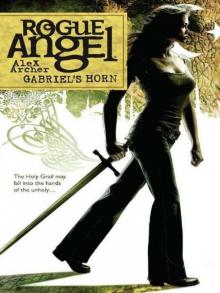 Gabriel's Horn
Gabriel's Horn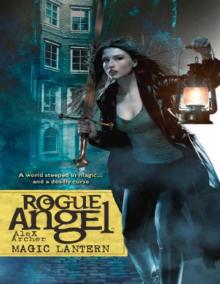 Magic Lantern (Rogue Angel)
Magic Lantern (Rogue Angel) God of Thunder
God of Thunder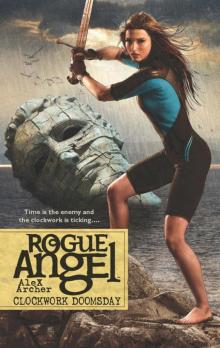 Clockwork Doomsday
Clockwork Doomsday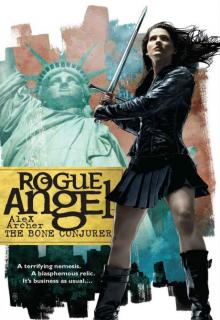 The Bone Conjurer
The Bone Conjurer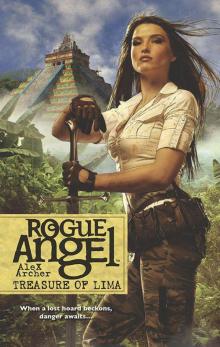 Treasure of Lima
Treasure of Lima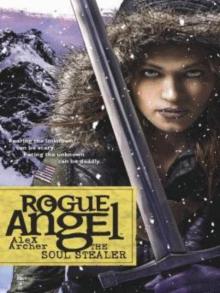 The Soul Stealer
The Soul Stealer The Dragon’s Mark
The Dragon’s Mark Restless Soul
Restless Soul Rogue Angel: God Of Thunder
Rogue Angel: God Of Thunder Rogue Angel 49: The Devil's Chord
Rogue Angel 49: The Devil's Chord Death Mask
Death Mask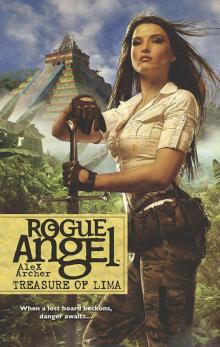 Rogue Angel 46: Treasure of Lima
Rogue Angel 46: Treasure of Lima Swordsman's Legacy
Swordsman's Legacy The Oracle's Message
The Oracle's Message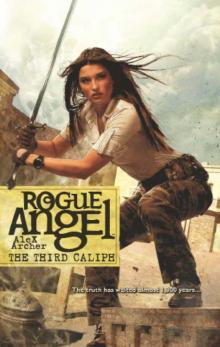 The Third Caliph
The Third Caliph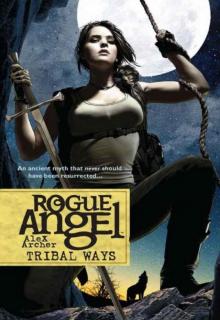 Tribal Ways
Tribal Ways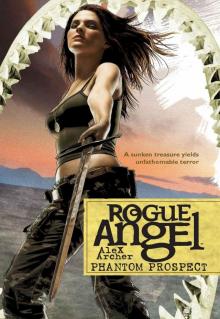 Phantom Prospect
Phantom Prospect Rogue Angel 50: Celtic Fire
Rogue Angel 50: Celtic Fire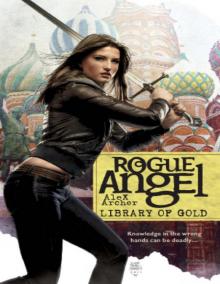 Library of Gold
Library of Gold Rogue Angel 53: Bathed in Blood
Rogue Angel 53: Bathed in Blood Sacred Ground
Sacred Ground The Devil's Chord
The Devil's Chord Serpent's Kiss
Serpent's Kiss The Vanishing Tribe
The Vanishing Tribe Sunken Pyramid
Sunken Pyramid Sunken Pyramid (Rogue Angel)
Sunken Pyramid (Rogue Angel)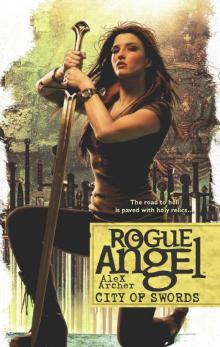 City of Swords
City of Swords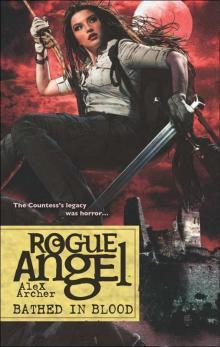 Bathed in Blood
Bathed in Blood The Lost Scrolls
The Lost Scrolls The Babel Codex
The Babel Codex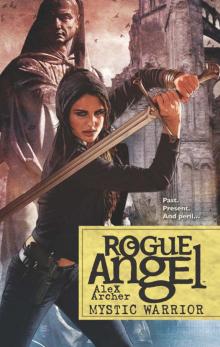 Mystic Warrior
Mystic Warrior Eternal Journey
Eternal Journey Beneath Still Waters
Beneath Still Waters Solomon's Jar
Solomon's Jar Beneath Still Waters (Rogue Angel Book 55)
Beneath Still Waters (Rogue Angel Book 55) Cradle of Solitude
Cradle of Solitude Secret of the Slaves
Secret of the Slaves River of Nightmares
River of Nightmares Polar Quest
Polar Quest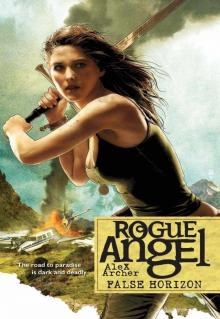 False Horizon
False Horizon